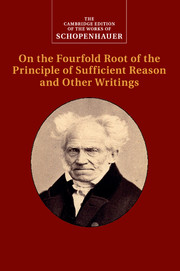Book contents
- Frontmatter
- Contents
- General Editor’s Preface
- Editorial Notes and References
- Introduction
- Notes on Text and Translation
- Chronology
- Bibliography
- Collation of the Two Editions of On the Fourfold Root
- 1 On the Fourfold Root of the Principle of Sufficient Reason
- 2 On Vision and Colours
- 3 On Will in Nature
- Glossary of Names
- Index
First Chapter - On Vision
Published online by Cambridge University Press: 30 June 2022
- Frontmatter
- Contents
- General Editor’s Preface
- Editorial Notes and References
- Introduction
- Notes on Text and Translation
- Chronology
- Bibliography
- Collation of the Two Editions of On the Fourfold Root
- 1 On the Fourfold Root of the Principle of Sufficient Reason
- 2 On Vision and Colours
- 3 On Will in Nature
- Glossary of Names
- Index
Summary
INTELLECTUAL NATURE OF INTUITION. DISTINCTION BETWEEN UNDERSTANDING AND REASON AND BETWEEN ILLUSION AND ERROR. COGNITION, THE CHARACTER OF ANIMALS. APPLICATION OF ALL THIS TO INTUITION THROUGH THE EYE
All intuition is intellectual. For without the understanding it would never come to intuition, to perception, apprehension of objects; rather, it would remain as mere sensation, which at most could have significance with regard to the will as pain or comfort, but would otherwise be a change of meaningless states and would not be anything similar to a cognition. For intuition, i.e., for cognition of an object first of all requires that the understanding refer any impression that the body receives to its cause, placing this cause in a priori intuited space, as the cause from which the effect proceeds, thus recognizing the cause as acting, as actual, i.e., as a representation of the same type and class as is the body. However, this transition from the effect to the cause is an immediate, vivid, necessary one: since it is a cognition of the pure understanding, it is neither an inference of reason nor a combination of concepts and judgements according to logical laws. Such a thing is the business of reason, which contributes nothing to intuition, but whose object is a completely different class of representations that on earth belongs only to the human race, namely, abstract, non-intuited representations, i.e., concepts; through concepts, however, humans have received their great advantages: language, science, and above all the discretion – only possible through the review of the whole of life – which keeps them independent of the impressions of the moment and makes it possible to act in a deliberate, premeditated, methodical way, whereby their activity is so clearly distinct from that of animals, and the condition for any deliberate choice among multiple motives is met, so that the most complete self-consciousness accompanies the decision of their will. All of this humans owe to concepts, i.e., to reason. Like all abstracta principles, the law of causality, as abstract principle, is, of course, reflection, and thus is an object of reason, but the actual, vivid, immediate, necessary cognition of the law of causality precedes all reflection as it precedes all experience, and it lies in the understanding.
- Type
- Chapter
- Information
- Schopenhauer: On the Fourfold Root of the Principle of Sufficient Reason and Other Writings , pp. 213 - 224Publisher: Cambridge University PressPrint publication year: 2012

